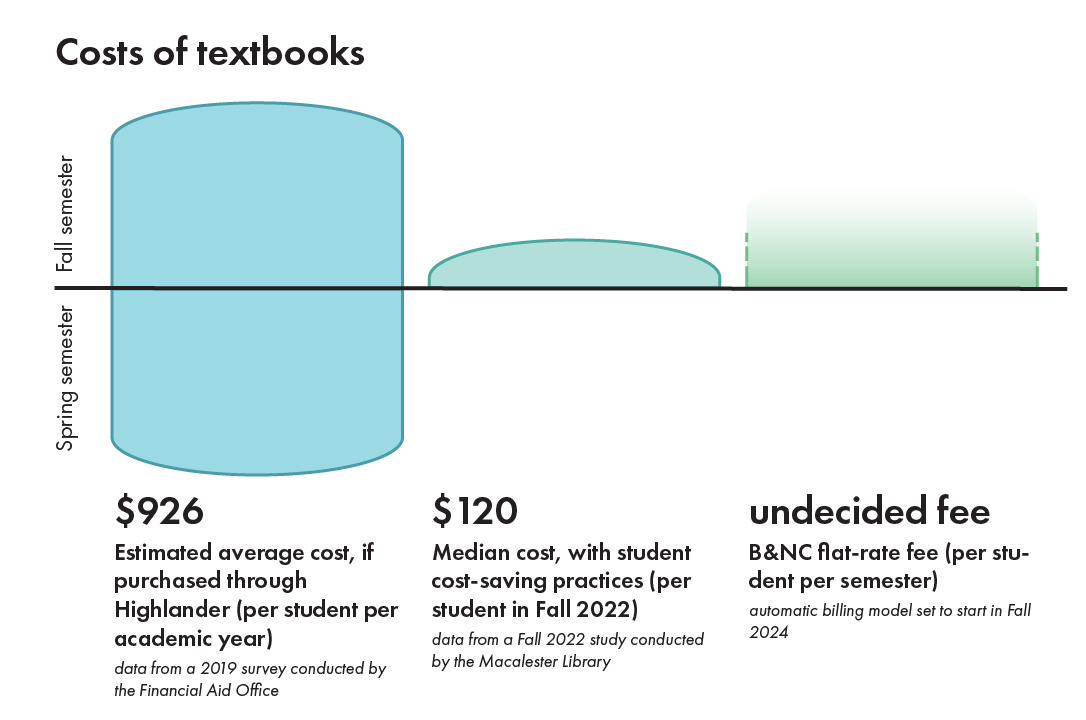How much money have you spent on course materials this semester? Beginning in Fall 2024, all Macalester students who do not have their course materials fully or partially covered through financial aid will spend the same amount on course materials. Macalester will be implementing an automatic textbook billing model, costing students a flat-rate fee at the start of each semester to access all their course materials through Barnes & Noble College (B&NC).
Instead of students purchasing their own course materials, whether through the Highlander Store, checking them out through the library’s course reserve program or obtaining textbooks via some other method, this means students will now pay a set fee, — which has not yet been decided — according to Vice President of Administration and Finance Patricia Langer. Through B&NC, students will automatically get access to all course materials for all of their classes, provided they pay the flat-rate fee.
“The primary goal of the inclusive access textbook program model is to improve the equity of experience for all Macalester students,” Langer wrote in an email to The Mac Weekly. “While we have programs in place now that provide limited access to course materials, every student having full time access to the course materials they need for the courses or majors they choose has been the primary goal since we began discussing early-adopting this program in 2020.”
Vice President of Admissions and Financial Aid Brian Lindeman ’89 explained that this contract will expand institutional equity by reducing students’ worries that they may have to forgo taking certain courses because of the price difference courses can bring with them.
“I think it solves one of the big challenges we’ve had over the years with students who … run into a course where they’ve got a big out-of-pocket expense for an online code or art supplies that perhaps they weren’t prepared for,” Lindeman said. “Those kinds of issues go away in this new model.”
Academic Affairs Committee (AAC) Chair Tristan Niedzielski ’25 feels that, although it is currently unknown how this contract will impact tuition costs, they worry this model may not expand institutional equity in the way it is meant to. They noted that this change to an automatic billing model likely came as a result of greater industry change, as B&NC has been moving towards rolling out on-campus bookstores like the Highlander.
“I think it’s a really admirable goal of what [administrators] are striving for with this [contract], and I think the ideas of inclusive access and equitable textbook access are really crucial to making college attendance more equitable,” Niedzielski said. “… however, I think the goal from Barnes & Noble [College’s] perspective is not centered around inclusive access; that is not what they’re trying to accomplish. Barnes & Noble [College] is trying to ensure that they maintain their market share of textbook access.”
Lindeman suggested that industry changes largely drove this change.
“My understanding is it really was that we didn’t have a choice if we wanted to continue to have Barnes & Noble College run our bookstore,” Lindeman said.
Lindeman explained that the influence of course materials on financial aid and cost of attendance is likely to remain the same, conceptually. The goal for this fee is to equal the estimated cost of course materials students already have to pay at Macalester. From a survey conducted by the Financial Aid office in 2019, that estimated cost of course materials for an entire academic year sits at $926.
“That [survey] was based on how much a student would need to pay if they bought all of their required course materials from the Highlander,” Lindeman said. “So if a student goes elsewhere … that’s fine, but we still take the cost of what they would get at the Highlander into account when we calculate the financial aid package.”
In this way, the estimated cost of course materials is not valued at the average amount students spend on course materials per semester, but the average cost of course materials if each book was bought from the Highlander, where prices are set by B&NC. Instead of buying from the Highlander, many students buy secondhand or thrifted books, receive books from a fellow student who already took the course or use extralegal means.
Additionally, a survey conducted by the library staff in September 2022 assessing course material costs and accessibility found that the median cost students paid for course materials per semester was $120, significantly lower than Financial Aid’s average estimated cost of course materials for the entire academic year.
This contract was not the first one proposed by B&NC to Macalester. There was a similar contract proposed by the Financial Barriers Working Group — a group composed of students, staff and faculty that worked to find solutions to financial inequalities within education — in 2021. The Macalester community at that time decided against signing this contract, with many students, staff and faculty voicing concerns about the proposed $414 flat-rate fee added to tuition each semester.
The contract will also have other effects on textbooks at Macalester such as the textbook reserve program. Because students will now get every book they need for their classes through this program, a place to check out out a specific book for a specific class will provide no help to students.
“I do anticipate that the need for a course reserve program will diminish,” Langer commented.
Library Director Angi Faiks told The Mac Weekly that she’s currently unsure of how this model will influence the course reserve program, but regardless of how the contract influences this course reserve program, Faiks believes the library’s initiatives to increase access to a variety of texts will continue.
“Many of the publishing/vendor models seem to help in some ways and hurt in others,” Faiks wrote in an email to The Mac Weekly. “And, at the same time, there is no perfect solution. No matter what the current status is, we in libraries will continue to work on complimentary or alternative options and to work towards more fair access to quality information and educational materials [for] the Macalester and broader community.”
For Niedzielski, the lack of information about this contract, such as how much the contract will add to tuition or how it will impact the course reserve program, highlights a greater communication problem within Macalester.
“At the end of the day, this work that’s been done around this contract and textbook affordability has started from such a great place,” Niedzielski said. “This Financial Barriers Working Group had representation from all facets of Macalester: students, faculty [and] staff. We started with that, and now we’ve ended in a place where a contract was signed, years after initial conversations, with no additional follow up, with no student, faculty or staff feedback, and real key stakeholders in this conversation being left in the complete dark.”








